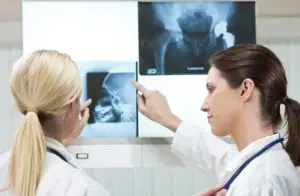
Whether you were hurt in a car accident, workplace accident, or another personal injury case, receiving a diagnosis of a traumatic brain injury (TBI) can be scary. With more than 64,000 TBI related deaths in 2020 alone, you or your family will be fighting to ensure the proper care is given for the injured victim. But if you were injured as a result of someone else’s negligence, how do you prove a traumatic brain injury was suffered?
At Munley Law Personal Injury Attorneys, we represent personal injury victims and their families who have suffered a traumatic brain injury and now are fighting for compensation from the insurance companies, or the liable party. If you suffered from a TBI following a car accident, workplace accident, or another event, call Munley Law Personal Injury Attorneys. We can help.
What is a Traumatic Brain Injury?
The Centers for Disease Control and Prevention (CDC) define traumatic brain injuries or TBI as “an injury that affects how the brain works. It may be caused by a bump, blow, or jolt to the head, or penetrating injury (such as from a gunshot) to the head.”
There are three levels or types of TBIs. They are:
- Mild TBI or concussion: The most common type of TBI, these occur when the head has been hit or jolted or the body is moved quickly resulting in the head and brain moving back and forth.
- Moderate TBI: Most often caused by a fall, car accident, or gunshot injury, moderate TBI victims often experience long-term health complications.
- Severe TBI: Considered the most fatal of TBIs, these also occur from traumatic impacts to the body. If a victim survives a severe TBI, they do often experience long term health complications.
How Do Most TBIs Occur?
According to the Mayo Clinic, most TBIs occur or are caused by:
- Falls: Most common in young children and older adults, falls from a bed, stairs, bath, etc. can result in traumatic brain injuries
- Car accidents: Car accidents involving standard passenger vehicles, motorcycles, bicycles and pedestrians are the most common cause of a TBI
- Violence: Gun violence, domestic violence, abuse, and assault
- Sports injuries: Most common in high-impact and extreme sports, TBIs in sports are very common for younger athletes
- Explosions: Pressure from explosives and other blasts can cause brain damage
- Penetrating wounds: Gunshots, debris, etc.
What are the Signs of a Traumatic Brain Injury?
Not all symptoms of a traumatic brain injury are obvious at the scene of an accident or emerge quickly. Some TBI signs do not appear for days or weeks following the trauma.
In mild TBIs, common warning signs and symptoms include:
- Physical ailments: headache, nausea and vomiting, fatigue, speech issues, dizziness
- Sensory sensitivity: blurred vision, ringing in ears, changes in taste and smell, light and sound sensitivity
- Cognitive symptoms: loss of consciousness, dazed, disoriented, memory/concentration issues, mood changes, depression and anxiety, insomnia, sleep more often than usual or for longer periods of time
In more severe TBIs, nerve damage, seizures, fluid drainage from ears or nose, agitation, and comas are common and can be life threatening.
What are the Long Term Complications After Suffering a TBI?
Personal injury victims who have suffered a TBI often face a long road to recovery and sometimes, are never 100 percent themselves again.
Long-term complications following a traumatic brain injury include:
- Physical health changes: seizures, fluid in the brain, blood vessel damage, infection, headaches
- Consciousness: comas, vegetative state, brain death
- Intellectual changes: memory, learning, reasoning and judgment issues, etc.
- Communication delays: difficulties writing, speaking or comprehending, changes in social skills, etc.
- Behavioral and emotional changes: Lack of self-control, outburst, depression, anxiety, anger, mood swings, lack of empathy
How Do You Prove a Traumatic Brain Injury?
If you or a loved one suffered a traumatic brain injury as the result of someone else’s negligence, you will need to prove the injury occured to seek compensation for your medical bills and long-term costs.
While you will have already met with a medical professional to assess the severity of the TBI, you and your legal team will once again have to prove a TBI occurred as a result of the accident.
Proving a TBI in Negotiations in Court, or With the Insurance Companies
Depending on the severity of your TBI and other injuries, you may first be in negotiations with the insurance company to seek compensation for your injuries. Or, if you have already determined that legal action against the negligence party is needed, you will still need to prove the TBI occurred to the court.
The first step is starting from the beginning. Here, you and/or your legal team will outline exactly how the accident occured. This will include evidence from police reports, testimony, photos, videos, etc.
This will also include establishing negligence about the liable party, and how their actions lead to your injuries and resulting traumatic brain injury.
You will need medical documentation for the TBI diagnosis. This may include medical exams, CT scans, MRIs, medication lists, and any procedures completed following the accident.
The Importance of Medical Professionals in Proving a TBI
 Evidence and documentation is key to a successful personal injury claim. While you as the victim will have a lot of testimony to provide the court, having medical professionals such as your own physician, or any of the medical staff that treated you following the event can be critical in proving not only the presence of a traumatic brain injury, but its severity and long-term implications.
Evidence and documentation is key to a successful personal injury claim. While you as the victim will have a lot of testimony to provide the court, having medical professionals such as your own physician, or any of the medical staff that treated you following the event can be critical in proving not only the presence of a traumatic brain injury, but its severity and long-term implications.
In the case of wrongful death, the family of the deceased will still need these individuals to testify to the court to show how the injury, resulting TBI, and complications ended in the death of the victim.
The Mayo Clinic utilizes the Glasgow Coma Scale in order to prove TBIs. The Glasgow Coma Scale is a 15-point test that helps assess the severity of a brain injury by checking a person’s ability to follow directions, move their eyes and limbs, and speech coherence. Scores are calculated from 3 to 15. Higher scores mean injuries are not as severe whereas lower scores show severe TBI.
While all of these are important in proving the TBI occurred, your doctor will also be asked to show the long-term effects of the TBI. Questions like your ability to return to work, ability to live independently, etc. will all factor into your personal injury case.
Proving a traumatic brain injury can be complicated, but the personal injury attorneys at Munley Law Personal Injury Attorneys are here to help.
Suffered a TBI as a Result of an Accident? Let Munley Law Personal Injury Attorneys Represent You.
At Munley Law Personal Injury Attorneys, our attorneys have been named to Best Lawyers in America because of our dedication to our clients. We know how challenging a personal injury case is, and when severe injuries like TBIs are involved, the results can be devastating.
This is why we work with countless medical professionals to prove the traumatic brain injury occurred as a result of the accident, and will work with your medical team to calculate your long-term health needs and financial costs.
No one should have to live with the consequences of someone else’s negligence, but unfortunately, this is all too often the case. But that doesn’t mean you have to shoulder the financial burden.
For a no-obligation free consultation, contact the personal injury lawyers of Munley Law Personal Injury Attorneys by calling 570-399-0406 or by contacting us online.









